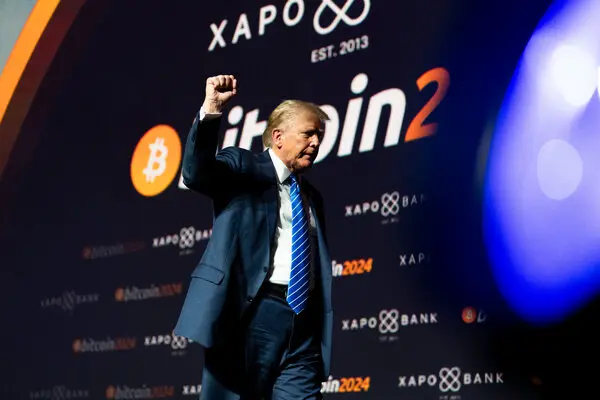As the 2024 U.S. elections approach, the intertwining of political dynamics and the cryptocurrency market has become increasingly apparent. Gary Gensler, chair of the U.S. Securities and Exchange Commission (SEC), recently criticized the cryptocurrency industry, describing it as “rife with fraud and hucksters.” His remarks highlight concerns about the regulatory environment, as many crypto firms struggle to comply with existing laws, leading to significant losses for investors .
However, amidst this regulatory scrutiny, a unique phenomenon has emerged: the “Trump trade.” This term refers to the market speculation surrounding a potential victory for Donald Trump, who has openly expressed his support for cryptocurrency. At a recent Bitcoin conference, Trump pledged to make the U.S. the “crypto capital of the planet” and suggested he would appoint a more favorable SEC chair if re-elected . This support has catalyzed a bullish sentiment among Bitcoin investors, as seen in the substantial net inflows into U.S. spot Bitcoin ETFs, which totaled nearly $2.4 billion in just six days .

Recent polling indicates a tight race between Trump and his opponent, Kamala Harris, further amplifying the speculation surrounding the cryptocurrency market. Many investors believe that a Trump administration would usher in a more favorable regulatory landscape for cryptocurrencies, driving up asset values in anticipation of such changes.
. Some analysts are even predicting Bitcoin could surge to $100,000, although there are warnings that Trump’s tariff policies might lead to inflationary pressures that could dampen the crypto bull run
Crypto Spending Surge in Elections
As the cryptocurrency industry seeks to bolster its influence in Washington, it has also made substantial financial contributions to political campaigns. A report by Public Citizen revealed that crypto corporations and wealthy investors have spent over $119 million directly influencing federal elections
. This spending is largely funneled into a non-partisan super PAC called Fairshake, which aims to support pro-crypto candidates . Notably, companies like Coinbase and Ripple have emerged as significant political spenders, accounting for nearly half of all corporate contributions this election cycle
.
Despite the industry’s enthusiasm and financial clout, a recent survey by the Federal Reserve found that only about 7% of Americans held or used cryptocurrency in 2023 . This statistic underscores the ongoing challenge of broadening cryptocurrency adoption beyond its existing loyal base.
Conclusion
The connection between the upcoming U.S. elections, a potential Trump victory, and the cryptocurrency market is undeniably intricate. As the industry navigates regulatory challenges and seeks to influence the political landscape, the outcome of the elections could play a pivotal role in shaping the future of cryptocurrency in America. Investors and enthusiasts alike are keeping a close eye on these developments, ready to react to any shifts that could propel the crypto market into new heights.
For more details on the relationship between U.S. elections and cryptocurrency trends, you can explore BBC News and Bloomberg for in-depth analyses.



Crypto market trends